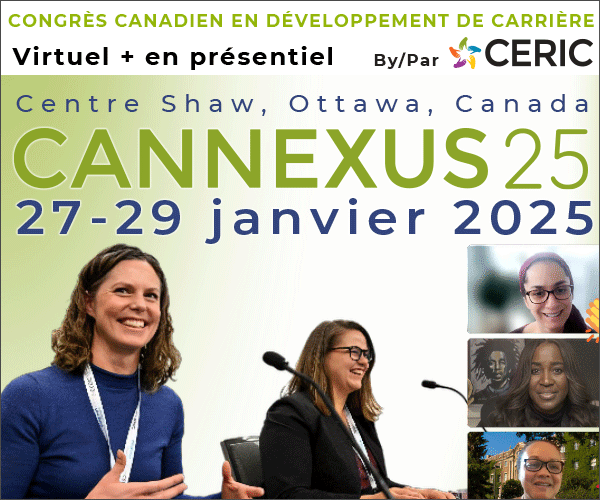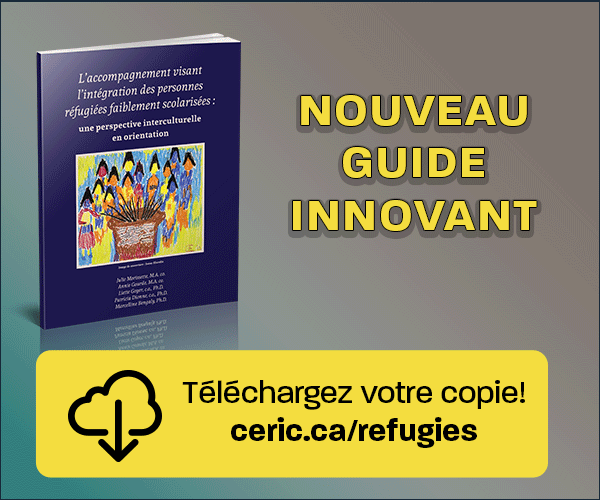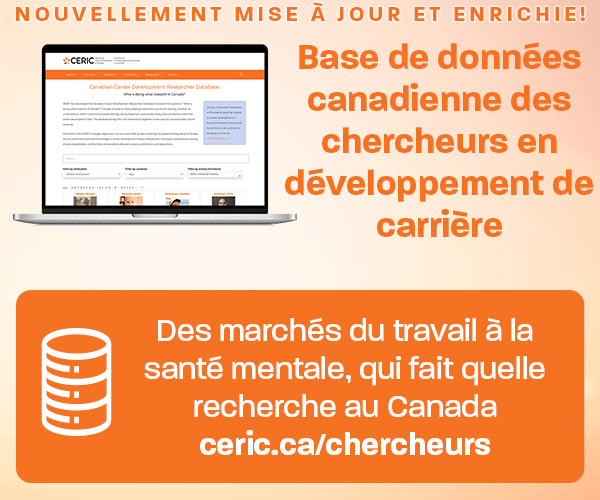Intelligence artificielle et résumé des expériences critiques
DOI :
https://doi.org/10.53379/cjcd.2022.338Mots-clés :
services de carrière, connaissances et compétences, l'enseignement coopératif, expérienceRésumé
En ce qui concerne les curriculum vitae, les soutiens aux étudiants ont tendance à inclure des commentaires tactiques qui traitent des problèmes dans l'écriture des étudiants et des commentaires stratégiques visant à entraîner une autoréflexion critique. Cependant, il n'y a pas toujours le temps de couvrir tout ce qui pourrait être offert par les deux types de rétroaction dans une seule critique de CV. Compte tenu des exigences en matière de temps du personnel, de nombreux administrateurs de services de carrière envisagent de tirer parti des produits basés sur l'intelligence artificielle (IA) qui pourraient offrir un retour tactique et permettre au personnel de se concentrer sur l'offre d'un retour stratégique. Dans le cadre d'une expérience sur le terrain, nous avons étudié comment l'utilisation par des chercheurs d'emploi novices d'un produit de critique de curriculum vitae basé sur l'IA influençait leurs expériences ultérieures de critique de curriculum vitae en personne, en particulier les types de rétroaction offerts et les résultats d'apprentissage qui en découlaient. Comme prévu, l'IA a offert une rétroaction tactique importante et moins de rétroaction stratégique. L'utilisation de l'IA par les étudiants ne s'est pas traduite par une plus grande possibilité de rétroaction stratégique et de résultats d'apprentissage associés.
Références
Amundson, N., Westwood, M., & Prefontaine, R. (1995). Cultural bridging and employment counselling with clients from different cultural backgrounds. Canadian Journal of Counselling, 29(3), 206-213. https://cjc-rcc.ucalgary.ca/article/view/58529/44028
Aoun, J. E. (2017). Robot-proof: Higher education in the age of artificial intelligence. MIT press.
Barney, M., & Madigan, J. (2019). Rethinking coaching and emotions with new artificial intelligence. Squarespace. https://static1.squarespace.com/static/56dd8a952b8dde60536232ed/t/5dbb61d186752115895e6079/1572561365471/Rethinking+Coaching+and+Emotions+with+New+AI+LeaderAmp+2019.pdf
Cox, A. M. (2021). Exploring the impact of artificial intelligence and robots on higher education through literature-based design fictions. International Journal of Educational Technology in Higher Education, 18(3). https://doi.org/10.1186/s41239-020-00237-8
Crozier, S. D., & Lalande, V. (1995). Cooperating with Coop. Paper presented at the Canadian Association of College and University Students Services Conference, Guelph, ON.
Dietsche, P., & Lees, J. (2017). Insight into Canadian post-secondary career service models: Final report. https://ceric.ca/project/insight-into-canadian-post-secondary-career-service-models/
Gallup. (2016). Gallup-Purdue index report: Great jobs. Great Lives. The value of career services, inclusive experiences and mentorship for college graduates. https://acue.org/wp-content/uploads/2018/11/Gallup-Purdue-Index-Study-Year-3-2016.pdf
Glikson, E., & Woolley, A. W. (2020). Human trust in artificial intelligence: Review of empirical research. Academy of Management Annals, 14(2). https://doi.org/10.5465/annals.2018.0057
Hattie, J., & Timperley, H. (2007). The power of feedback. Review of Educational Research, 77(1), 81-112. https://www.jstor.org/stable/4624888
Koo, T. K., & Li, M. Y. (2016). A guideline of selecting and reporting intraclass correlation coefficients for reliability research. Journal of Chiropractic Medicine, 15(2), 155-163.
Lalande, V., & DeBoer, J. (2012). Evaluation of an online psychoeducational career workshop. In R. Shea and R. Joy (Eds.), A multi-sectoral approach to career development: A decade of Canadian research (pp. 330-342). Canadian Journal of Career Development. https://cjcd-rcdc.ceric.ca/index.php/cjcd/anniversary
Lee, T., Jagannath, K., Aggarwal, N., Sridar, R., Wilde, S., Hill, T., & Chen, Y. (2019). Intelligent career advisers in your pocket? A need assessment study of chatbots for student career advising. AMCIS 2019 Proceedings. https://aisel.aisnet.org/amcis2019/human_computer_interact/human_computer_interact/14/
Luo, X., Tong, S., Fang, Z., & Qu, Z. (2019). Frontiers: Machines vs. humans: The impact of artificial intelligence chatbot disclosure on customer purchases. Marketing Science, 38 (6), 937–947. https://doi.org/10.1287/mksc.2019.1192
Makela, J. P., Seo, G., Sun, H., & Rooney, G. S. (2014). The value of using career services: A comparison of users and non-users. The Career Center, University of Illinois at Urbana-Champaign. https://www.careercenter.illinois.edu/sites/default/files/downloads/NASPAReport-Value-FINAL.pdf
McDow, L. W., & Zabrucky, K. M. (2015). Effectiveness of a career development course on students’ job search skills and self-efficacy. Journal of College Student Development, 56(6), 632-636. https://doi.org/10.1353/csd.2015.0058
Nguyen, J., Sánchez-Hernández, G., Armisen, A., Agell, N., Rovira, X., & Angulo, C. (2018). A linguistic multi-criteria decision-aiding system to support university career services. Applied Soft Computing, 67, 933-940. https://doi.org/10.1016/j.asoc.2017.06.052
Razack, H. I. A., Mathew, S. T., Saad, F. F. A., & Alqahtani, S. A. (2021). Artificial intelligence-assisted tools for redefining the communication landscape of the scholarly world. Science Editing, 8(2), 134-144.
Sampson, J. P., & Reardon, R. C. (1998). Maximizing staff resources in meeting the needs of job seekers in one-stop centers. Journal of Employment Counseling, 35(2), 50-68.
Shore, T., Tashchian, A., & Forrester, W. R. (2021). The influence of resume quality and ethnicity cues on employment decisions. Journal of Business and Economics Management, 22(1), 61-76. https://doi.org/10.3846/jbem.2020.13670
Stevens, A. H., Kurlaender, M., & Grosz, M. (2019). Career technical education and labor market outcomes: Evidence from California community colleges. The Journal of Human Resources, 54, 986-1036. https://doi.org/10.3368/jhr.54.4.1015.7449R2
Tong, S., Jia, N., Luo, X., & Fang, Z. (2021). The Janus face of artificial intelligence feedback: Deployment versus disclosure effects on employee performance. Strategic Management Journal, 42(9), 1600-1631. https://doi.org/10.1002/smj.3322
Toporek, R. L., & Cohen, R. F. (2017). Strength-based narrative résumé counseling: Constructing positive career identities from difficult employment histories. The Career Development Quarterly, 65(3), 222–236. https://doi.org/10.1002/cdq.12094
Toporek, R. L., & Flamer, C. (2009). The résumé’s secret identity: A tool for narrative exploration in multicultural career counseling. Journal of Employment Counseling, 46(1), 4-17.
Zeithaml, V. A., Berry, L. L., & Parasuraman, A. (1996). The behavioral consequences of service quality. Journal of Marketing, 60(2), 31-46. https://journals.sagepub.com/doi/pdf/10.1177/002224299606000203?casa_token=FRdMemSFH3MAAAAA:EKsWsf4Pid3FQHf6_jN5rAFCGiKzrZJALHU3ty1kaTxMOqt49GOzRFtwafihrZ71MtwKnWwkhDLs

Téléchargements
Publié-e
Comment citer
Numéro
Rubrique
Licence
(c) Tous droits réservés La Revue canadienne de développement de carrière 2022

Cette œuvre est sous licence Creative Commons Attribution - Pas d'Utilisation Commerciale - Pas de Modification 4.0 International.











